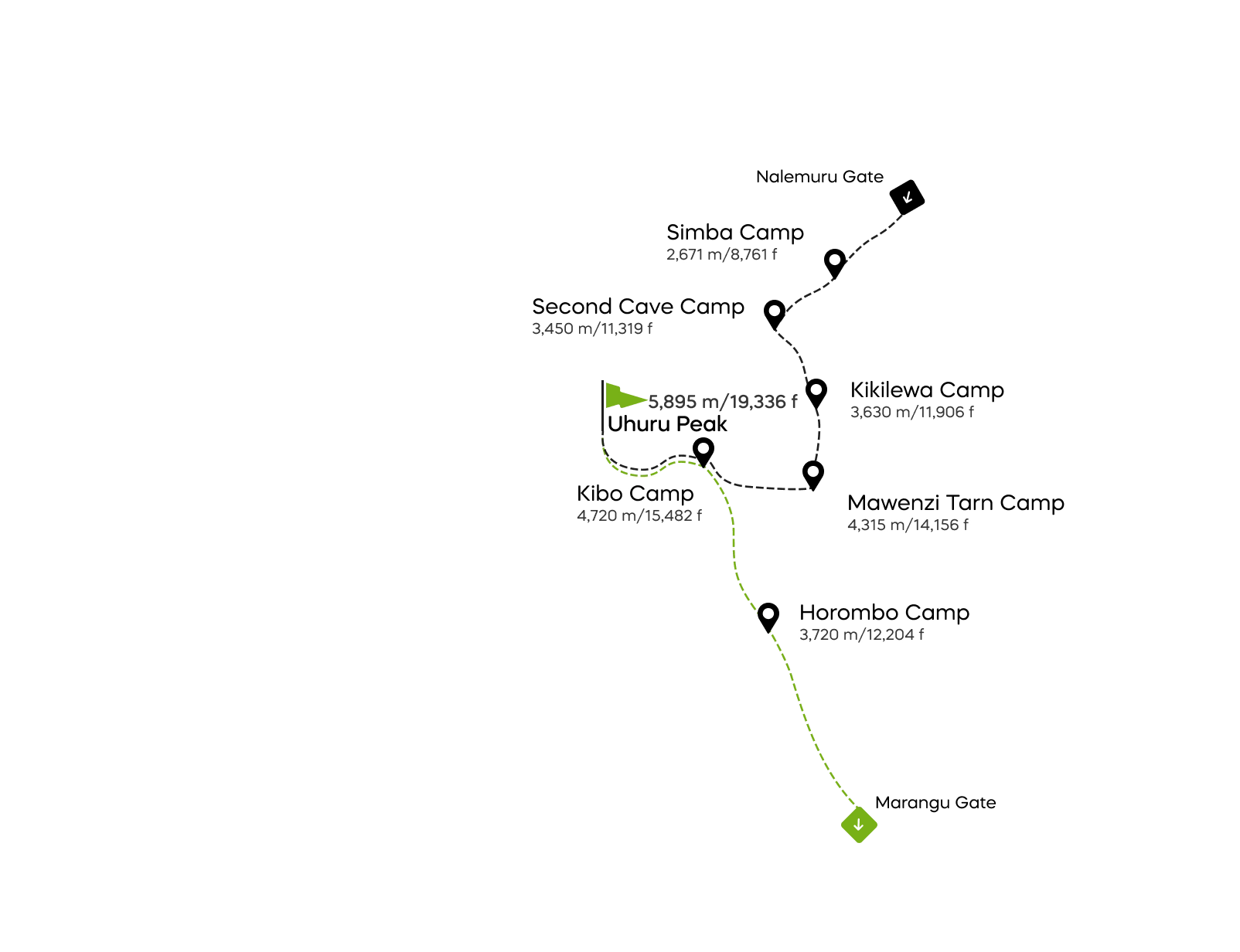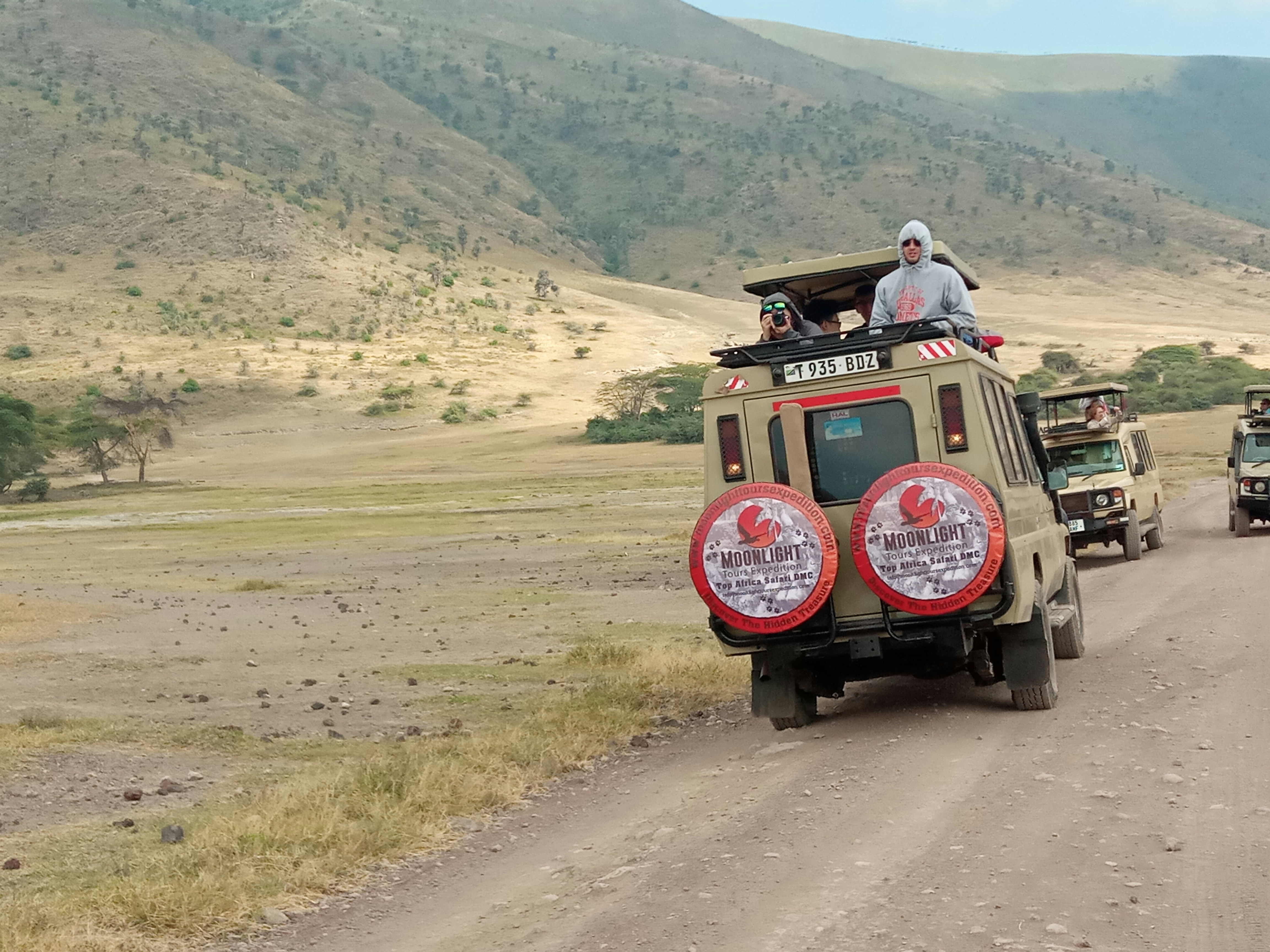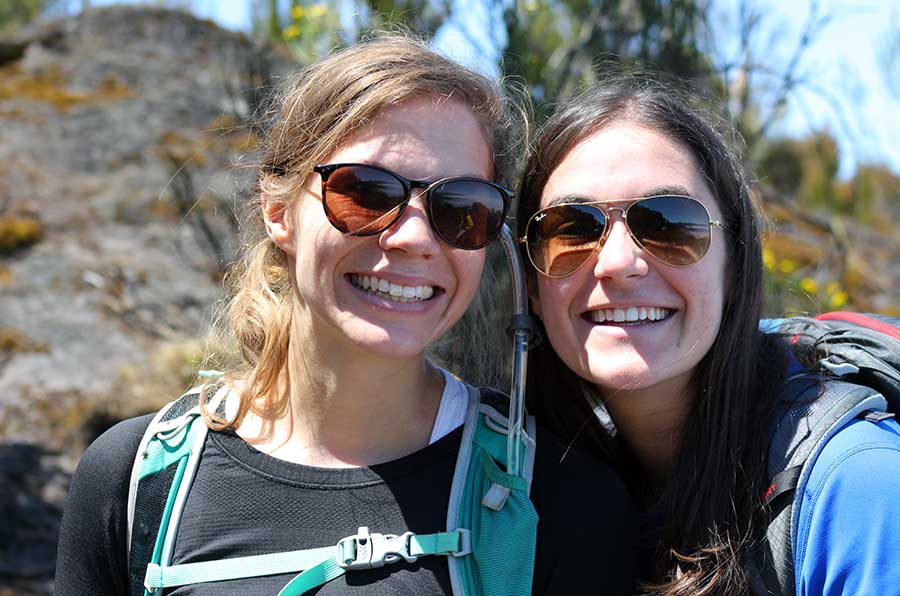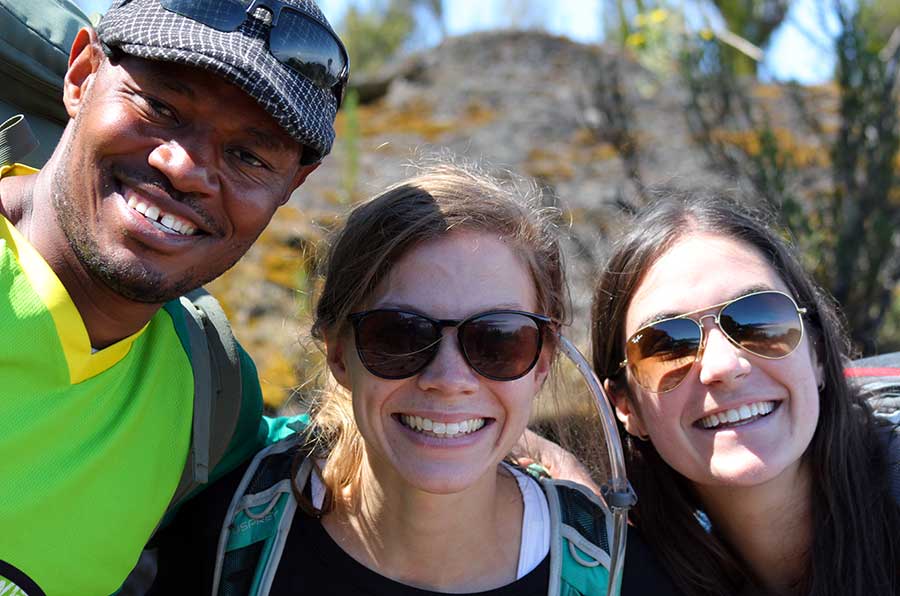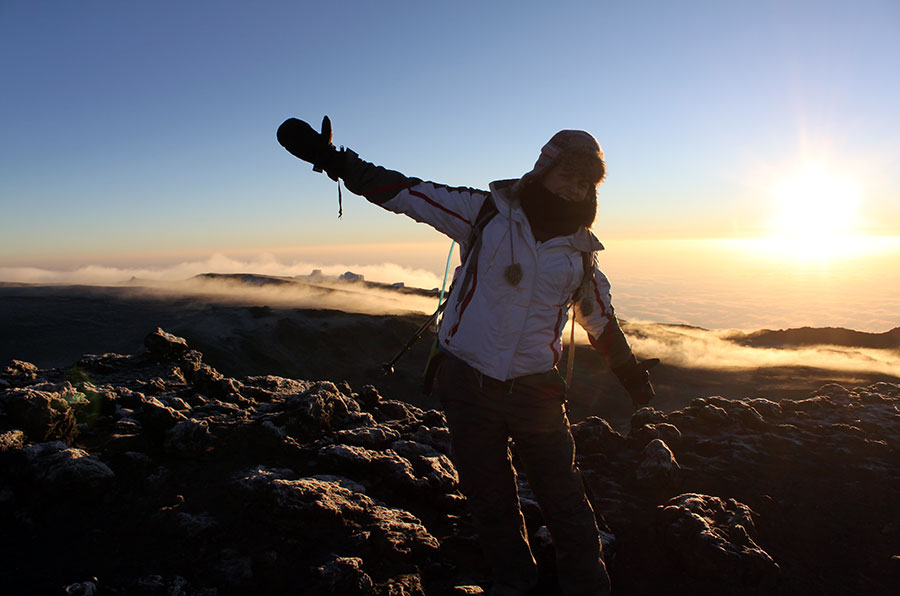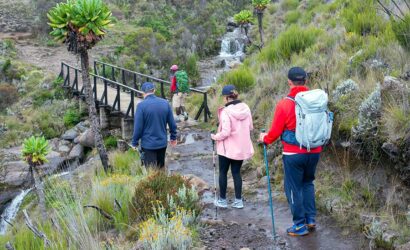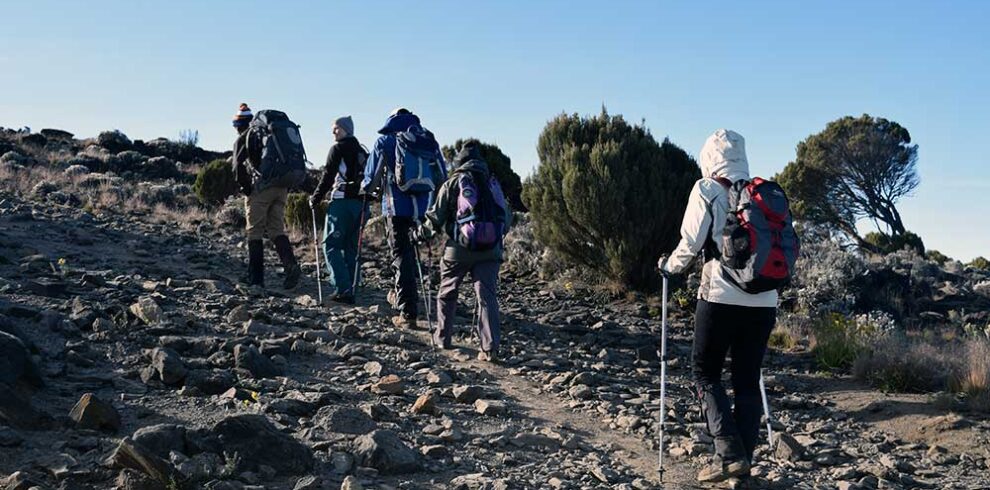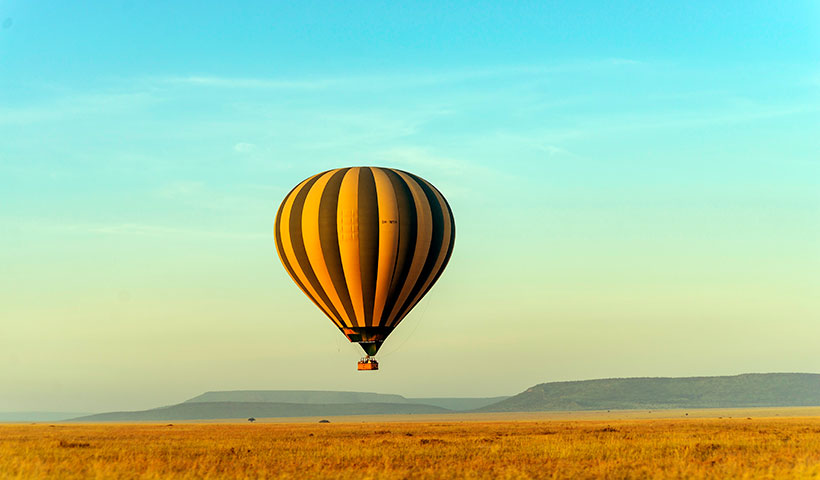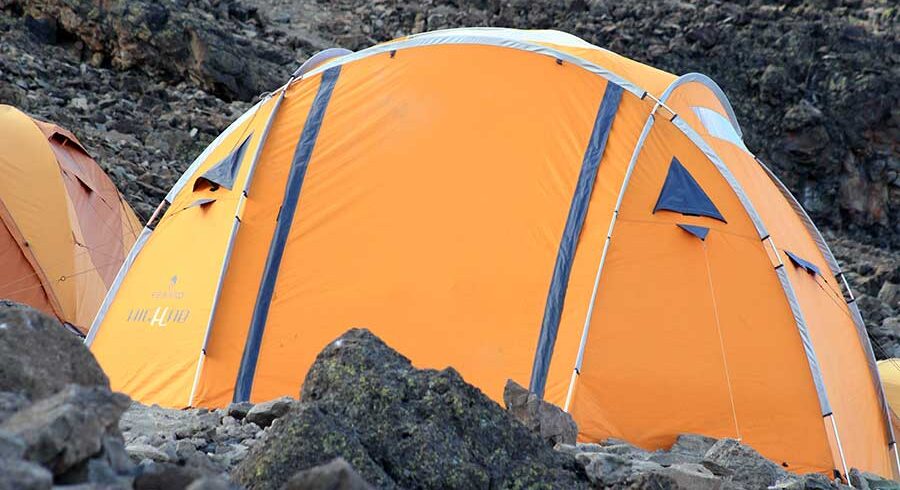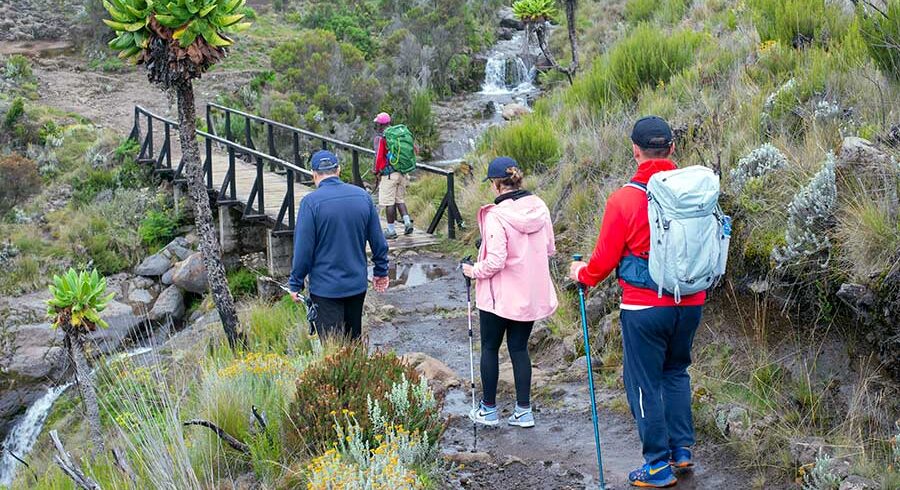Overview
There are six established routes to climb Mount Kilimanjaro – Marangu, Machame, Lemosho, Shira, Rongai and Umbwe. The Marangu, Machame, and Umbwe routes all approach from the south of the mountain. The Lemosho and Shira routes approach from the west. The Rongai route approaches from the north. All routes except Marangu and Rongai descend via Mweka.
Climbing Mount Kilimanjaro via The Rongai Route
Less crowded because of its remote location the route offers trekkers a unique wilderness experience where it is possible to see large wildlife like antelope, elephant and buffalo. As there is typically less moisture on this side of the mountain you are less likely to encounter rain and have more unclouded views of the peak. While it is flatter, it does not give the climb high sleep low option and therefore recommended to select more days for acclimatization.
The Rongai route is one of the easier routes up Kilimanjaro. Rongai is the only route to approach Kilimanjaro from the north, and the descent is via the Marangu Route. Summit night from Kibo Hut is steep and follows the same path taken by the Marangu route, which passes Gilman’s Point to Uhuru Peak.
There are several variations; the one described is a longer route taking in Mawenzi Tarn.
Tour Highlights
- Departure and Return Place: Moshi Town to Rongai Gate and then back to Kilimanjaro International Airport (Google Map)
- Departure Time: Please be ready by 8:15 AM for a prompt departure at 9:30 AM.
- Return Time: Approximately 10:30 AM on the last day.
- Dress Code: Casual. Comfortable athletic clothing, hiking shoes, hat, cold weather jacket, gloves, pants, and spare clothing.
- Accommodation: Two nights of accommodations based on Bed and Breakfast at 3 stars hotel (upgrades on request).
- Customizations: Can be customized upon request, to meet traveller’s needs
- Extensions: Trip Extensions are available on request.
- Trip Availability: All year round.
As you arrive at Kilimanjaro International Airport, our dedicated driver will be eagerly anticipating your arrival at the airport holding a sign with your name on it, ready to extend a warm and heartfelt welcome. From there, a seamless and comfortable transfer service will whisk you away to our enchanting Springlands Hotel. Upon arrival at the hotel, you will be served a delicious meal. Later on, our experienced mountain coordinators and your Guide will give you a pre-trekking briefing, an exciting opportunity to learn about the wonders that await you in your upcoming expedition.
Enjoy the relaxing environment of Springland Hotel with a swimming pool, a beautiful garden with a bar and a restaurant.
After breakfast at the hotel, you’ll set off on a 2 to 3-hour drive toward the Rongai Gate, passing through scenic farmlands and rural villages. Upon arriving at the gate, you’ll complete the registration process before beginning your trek through lush farmlands and pine forests. The trail starts with a gentle ascent, allowing you to gradually adjust to the altitude. Along the way, you might spot wildlife such as colobus monkeys. The peaceful surroundings offer a great introduction to Kilimanjaro’s diverse landscapes. Once you arrive at Simba Camp, you’ll enjoy a hot meal and settle in for the night, resting up for the days ahead.
Altitude: 1,950 meters (6,398 feet) – 2,600 meters (8,530 feet)
Hiking distance: 8 km
Hiking time: 3 -4 hours
After an early breakfast, you’ll set off on your trek, ascending through the beautiful moorland zone. As you climb higher, the landscape opens up, offering stunning views of the eastern ice fields along Kilimanjaro’s crater rim. The trail becomes steeper as you approach Kikelewa Camp, where you’ll be greeted with breathtaking panoramic views of the surrounding landscapes. Upon arrival at the camp, you’ll enjoy a hot, freshly prepared meal, and settle in for a well-deserved rest, soaking in the serenity of the high-altitude environment as you prepare for the next stage of your adventure.
Altitude: 2,600 meters (8,530 feet) – 3,600 meters (11,810 feet)
Hiking distance: 8 km
Hiking time: 4–5 hours
Today’s trek is shorter but steeper, taking you through grassy slopes that lead to the stunning Mawenzi Tarn, nestled beneath the towering cliffs of Mawenzi Peak. The campsite is set in a dramatic, picturesque landscape with breathtaking views in every direction. Upon arrival, you’ll enjoy a hot lunch and have time to relax or take a short acclimatization hike to help your body adjust to the altitude. In the evening, you’ll be served dinner, followed by an informative briefing from your guide to prepare you for the next day’s trek to higher altitudes.
Altitude: 3,600 meters (11,810 feet) – 4,315 meters (14,157 feet)
Hiking distance: 6 km
Hiking time: 3–4 hours
After an early breakfast, you’ll set off on your trek, ascending through the beautiful moorland zone. As you climb higher, the landscape opens up, offering stunning views of the eastern ice fields along Kilimanjaro’s crater rim. The trail becomes steeper as you approach Kikelewa Camp, where you’ll be greeted with breathtaking panoramic views of the surrounding landscapes. Upon arrival at the camp, you’ll enjoy a hot, freshly prepared meal, and settle in for a well-deserved rest, soaking in the serenity of the high-altitude environment as you prepare for the next stage of your adventure.
Altitude: 4,315 meters (14,157 feet) – 4,720 meters (15,486 feet)
Hiking distance: 8 km
Hiking time: 5–6 hours
Around midnight, you’ll be awakened to begin the final ascent toward Uhuru Peak. The journey to Gillman’s Point, at 5,685 meters, is steep and strenuous, typically taking around six hours of steady climbing. This challenging section will test your endurance, but your guide will offer support along the way. Once you reach Gillman’s Point, you’ll traverse the crater rim toward Uhuru Peak, the highest point in Africa. If the weather cooperates, you’ll be rewarded with a breathtaking sunrise over the continent. After celebrating your incredible achievement at the summit, you’ll descend to Kibo Hut for a short rest before continuing onward to Horombo Hut for the night.
Altitude: 4,700 meters (15,419 feet) – 5,895 meters (19,341 feet) – 3,720 meters (12,205 feet)
Hiking distance: 22 km
Hiking time: 12–15 hours
After breakfast, you’ll start your descent through the diverse moorland and lush rainforest zones, making your way back to Marangu Gate. As you trek downward, take in the final views of the landscape and reflect on your accomplishment. Upon reaching the gate, you’ll be presented with your well-earned summit certificate as a testament to your achievement. From there, you’ll be driven back to Springlands Hotel in Moshi, where a hot meal, a refreshing shower, and a comfortable bed await. If you’re interested in extending your adventure, you can meet with our safari coordinator to explore options like a thrilling wildlife safari or a relaxing trip to the stunning beaches of Zanzibar.
Altitude: 3,720 meters (12,205 feet) – 1,830 meters (6,004 feet)
Hiking distance: 20 km
Hiking time: 6–7 hours
Includes
- Quality Mess tents with a table and chairs
- Kilimanjaro summit certificate
- Guides, Porters, Cook salaries and park fees
- Large portions of fresh, healthy, nutritious food
- Camping or Hut fees (part of park fees)
- Emergency Oxygen Cylinder
- VAT (18% charged by the Government)
- All meals while on the Mountain
- Rescue fees (part of park fees)
- All transfers to the mountain and back to your Moshi hotel
- Sleeping Mattress
- Conservation fees (part of park fees)
- Professional, experienced mountain guides
- Clean, purified drinking water
- Quality, waterproof, four-season mountain sleeping tent (on twin sharing basis)
Excludes
- Liquors, beers and bottled beverages
- Hotel (available as an optional addon)
- Personal Expenses (e.g. laundry, telephone, beverages, etc.)
- Tanzania Visa
- Transfers (available as an optional addon)
- Meals not listed in the itinerary
- Surcharge for online payment of advance and balance (5% on each payment)
- Tips and gratuities
- International and domestic flights
- Personal trekking equipment such as sleeping bags, hiking boots, clothes, etc (available for renting)
- Travel insurance
Mount Kilimanjaro can be climbed anytime throughout the year. Most travelers prefer climbing during the dry seasons: December to March, June to October. Many consider the best months to climb Kilimanjaro to be January, February, and September.
We are. We are not agents for anybody, but run the treks ourselves through our own Tanzanian company. So you can rest assured that whoever you speak to in our company has climbed Kilimanjaro – and probably many times.
There are at least six routes to the top, Uhuru peak. You will hike between 53 and 73km depending on which route you choose. The shortest and toughest is the 5-day Umbwe route. Allowing extra days will help you to acclimatize better and improve your chances of reaching the summit. The easiest and most popular route is Marangu (which can be done in five), but we use six days for this route.
None, but previous hiking or climbing experience will help. You need to be fit and healthy and have a good pair of worn-in hiking boots. The fitter you are the more you are likely to enjoy it.
Your Kilimanjaro dream climb is entirely your own to design. We will work with you to customize exactly the triumphant Tanzanian mountainous quest experience you want. You go with the people you choose. You leave on whatever day you wish. You decide on your preferred route option, pace, and the number of days you will take.
On most routes, you’ll trek 4-7 hours most days. On certain routes you’ll trek as many as 10-15 hours on the longest days.
Prior to the climb, you’ll enjoy an acclimatization day with wildlife viewing and nature walks. Trekking through the rain forest, you’re likely to spot black-and-white Colobus monkeys, tropical birds and more.
Highly-trained chefs prepare three hot nutritious meals daily, as well as trail snacks and afternoon tea each day. You’ll eat all your meals in a solar-lit dining tent with your fellow trekkers and head guide. Delicious vegetarian, vegan, gluten-free and other specialty meals can be provided (with advance request). We’re happy to send you a sample menu—just ask!
Your mountain camps are set up and broken down each day by expert camp porters. You’ll stay in double occupancy all-weather tents with full-ground pads to keep you and your gear dry. Private toilet tents, solar-lit dining tents with tables and chairs, and basins of hot water for washing are provided in every camp. Grand Traverse treks include upgraded solar-lit walk-in-height sleeping tents with mountaineering beds and mattresses for additional comfort.
We are. We are not agents for anybody, but run the treks ourselves through our own registered Tanzanian local company.
Yes, we do arrange this. Please send your request to Safari.
You will need a passport that is valid at least six months beyond your dates of travel with an entry or re-entry visa, duly endorsed.
The mountain is in Tanzania, East Africa, about 350km from the equator. The nearest towns are Moshi and Arusha.
Mount Kilimanjaro is the highest freestanding mountain in the world and the highest mountain in Africa. Its highest point is Uhuru Peak on the Kibo crater at 5895m above sea level.
Yes, it is expected and much appreciated. The amount depends on the number of days, but can range from $150 and $350 per hiker. Tips are pooled and shared amongst the crew.
Rongai Map
